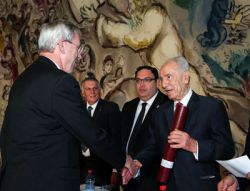
[2013-05-07] Peter Zoller and Ignacio Cirac received the 2013 Wolf Prize for Physics for their groundbreaking theoretical contributions to quantum information processing, quantum optics and the physics of quantum gases. The Prize was presented by the President of Israel Shimon Peres at Knesset in Jerusalem.
The prize, valued US$ 100,000, is awarded by the Wolf Foundation in Israel for outstanding achievements in the field of physics. The two laureates Cirac and Zoller have intensely collaborated on projects for a long time. They have left their mark in the field of quantum information and suggested several groundbreaking concepts for new developments in this research field. For example, Cirac and Zoller suggested a concept for a quantum computer based on the interaction between lasers and cold and electromagnetically trapped ions. This novel idea has already been realized experimentally and is among the most promising concepts for developing a scalable quantum computer. Other Wolf Prize laureates in Jerusalem were Jared Diamond and Joachim Messing (agriculture), George D. Mostow and Michael Artin (mathematics) and Robert S. Langer (chemistry) as well as Eduardo Souto de Mouro (architecture).
Prestigious Recognition
Peter Zoller lectures and researches at the University of Innsbruck and is Scientific Director at the Institute for Quantum Optics and Quantum Information (IQOQI) at the Austrian Academy of Sciences (ÖAW). Ignacio Cirac is Director at the Max-Planck Institute fro Quantum Optics in Garching near Munich. Before he was called to Germany, Cirac was Professor of Theoretical Physics at the University of Innsbruck from 1996 to 2001. The Wolf Prize has been awarded since 1978 and is one of the most prestigious international awards in the sciences and arts. It is awarded in the fields of chemistry, mathematics, medicine, physics and agriculture as well as in architecture, music, painting and sculpture. Fifteen of the fifty Wolf Prize awardees in physics also went on to win the Nobel Prize thereafter. The prize was established by Ricardo Wolf and his wife in 1976.